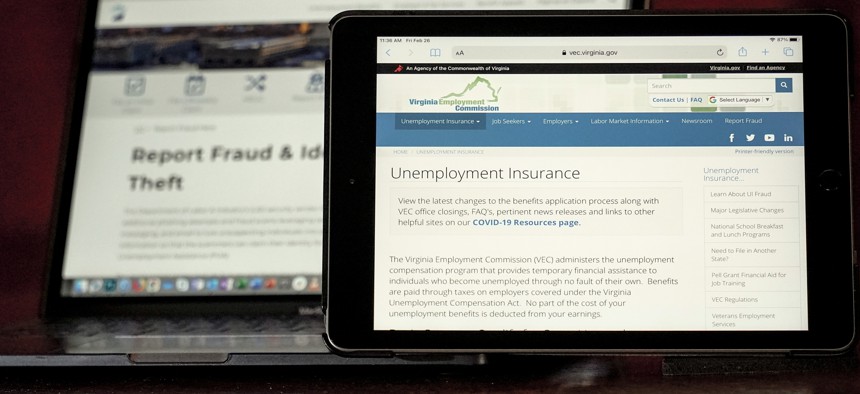Feds Step In to Assist States With Unemployment Fixes

Web pages used to show information for collecting unemployment insurance in Virginia, right, and reporting fraud and identity theft in Pennsylvania, are displayed on the respective state web pages, Friday, Feb. 26, 2021. AP Photo/Keith Srakocic
The Labor Department has deployed “tiger teams” to six state unemployment agencies, with experts looking for solutions to speed up payments and reduce fraud.
State unemployment insurance systems were stress tested at the outset of the coronavirus pandemic by a deluge of unemployment claims. Many failed.
The experience frustrated both state unemployment agencies and claimants and has prompted some states to overhaul and modernize their systems.
To aid in the process, the Department of Labor is offering a way to help diagnose states’ most pressing unemployment insurance issues through the deployment of “tiger teams.”
The tiger team concept has a decades-long history in the federal government and involves assembling a group of experts and specialists to tackle especially difficult problems.
Teams are deployed in six states—Colorado, Washington, Kansas, Nevada, Virginia and Wisconsin—to complete assessments that will be used to identify problems contributing to backlogs and to develop solutions. The states are participating on a voluntary basis in the program, but their participation will ensure they are eligible for a portion of a pool of $200 million the federal government is offering to states that implement the identified fixes, said Michele Evermore, a senior advisor on unemployment insurance at the DOL.
DOL plans to make the tiger team assessments an available resource to all states that would like the additional help, she said.
The assessments are part of a broader effort by DOL to crack down on fraud that plagued many unemployment systems during the pandemic. By finding better ways to detect and prevent fraudulent claims, experts believe states will be able to eliminate some of the backlogs that have prevented eligible workers from receiving benefits in a timely fashion.
“When you find a fraud solution, you are finding an equity solution and you are clearing out the backlogs,” Evermore said in an interview. “The backlog is not initial claims, it’s people who are flagged for fraud.”
Even as fewer people are filing for and receiving unemployment and the federal government has ended supplemental benefits, many states are still slogging through backlogs to pay out benefits owed to residents or address fraud concerns.
In Virginia, legislative auditors found this week that the Virginia Employment Commission has 100,000 claims pending that require adjudication. While federal guidelines mandate that the adjudication of unemployment applications should take less than 21 days, the audit found that just 2% of cases met that standard. Auditors found that 82% of adjudications took longer than 70 days.
A federal class action lawsuit filed on behalf of unemployed Virginia residents remains pending as the state has worked to address the delays.
DOL’s tiger teams in each state consist of six to nine people, both contractors and federal employees, who have expertise in process management, fraud detection, equity, unemployment insurance systems and technology, Evermore said. Those teams are tasked with interviewing state unemployment agency officials to analyze processes in each state and to identify possible logjams. Working with a centralized federal support team, the tiger teams will be able to share findings and solutions across states.
“The central team is to make sure we are coordinating across states and keeping a repository of solutions,” Evermore said.
The teams have been working with state agencies for about a month and will likely make recommendations after spending about two to three months working with local officials, she said.
The process may be simplified for states that participate later depending on the teams’ findings and recommendations.
Andrea Noble is a staff correspondent with Route Fifty.
NEXT STORY: Hard Work Isn’t the Point of the Office





